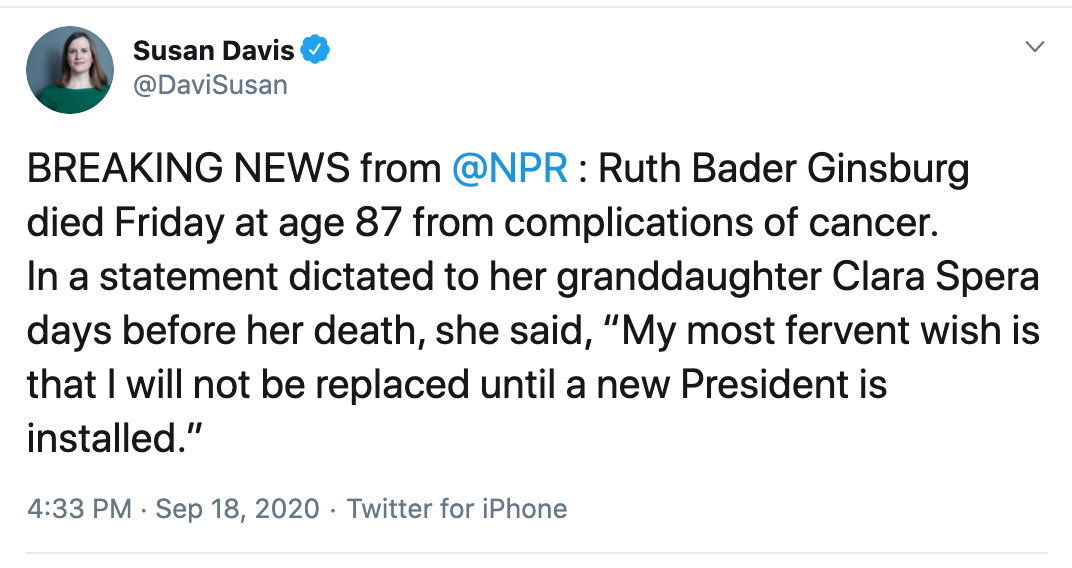
I just walked down the street to get some mail. I took a deep breath after a week of hard work, and thought about how happy I was that the smoke was finally, after a full week, forecasted to lift tomorrow morning. Then I opened the computer and felt my stomach go sour: after years of fragile health, Supreme Court Justice Ruth Bader Ginsburg had died at the age of 87.
For those of you outside of the United States, it’s hard to overstate the significance of Ginsburg, better known as RBG, in the popular progressive imagination. She has become a celebrity in old age, a signifier of the resiliency and endurance of progressive ideals, a feminist of the old school who has become a hero to next generation: The Notorious RBG who takes zero shit and demands that moral arc of the universe continue its bend towards justice.
Like all celebrities, her importance has been, to some extent, extended beyond her actual rulings, her actual words, her actual politics. But RBG’s refusal to die or retire felt like an expression of democracy’s last stand: if RBG could make it to the theoretical end of a Trump presidency, then maybe the integrity of our country could as well. It should be clear to anyone who’s closely followed RBG’s health over the last few years that she fought like hell to make that happen. But a body, and a democracy, can only take so much.
There are so many reasons why people in the United States feel unmoored, defeated, and deeply, deeply sad in this moment. Many of them are the same reasons that conservatives are cheering: Trump, aided by Mitch McConnell, will certainly seek to replace her with an ultra-conservative judge. The fine ideological balance of the court that has thus far preserved Roe v. Wade will tilt to the right, and hard-fought rights for gay people, trans people, women, disabled people, disenfranchised, people who benefit from the Affordable Care Act, the list goes on — all will be at risk in some capacity.
I don’t mean to be hyperbolic here. But a Trump appointee would mark the beginning of a new era of the Supreme Court, and if someone has only been granted rights in recent memory, it’s easy and understandable that a lot of us are imagining just how readily those rights could be taken away.
And then there’s the matter of the election, and the Supreme Court’s role in deciding what happens with recounts, allegations of fraud, or other forms of election integrity. The decision to abandon the recount in the Bush v. Gore presidential election in 2000 — that was the Supreme Court. And given the current state of the voting process, the amount of doubt and disinformation that Trump has injected into the process, and his pre-existing claims of “stealing” elections, it seems likely that some component of this election will end up before the Court.
Ginsburg’s “most fervent wish,” according to a statement dictated to her granddaughter, was that she not be replaced until the end of this term. Of course, her wish has little sway: in 2019, McConnell was on the record saying “oh we’d fill it” when asked about whether he’d move on a Supreme Court vacancy in an election year. (It’s worth pointing out, of course, that McConnell and the senate refused to confirm Obama’s Supreme Court nominee, Merrick Garland, back in 2016).
That sort of craven hypocrisy is not surprising; it is has become the constant of Trump and McConnell’s Republican party. But RBG was positioned, and really felt, like its antidote. Which is why her death, so soon after John Lewis’s, feels like a last stopgap has been removed. From the roving bands of armed vigilantes stopping reporters and suspected antifa at make-shift checkpoints amidst the Oregon fires to the shooting in Kenosha, our already eroded norms and standards are in tatters. A constitutional crisis feels imminent. If democracy was in danger before, what do we call this?
Again: this is what it feels like right now. I’m writing this to you from my very safe, very isolated dining room table. Celebrity deaths feel devastating, despite any form of personal connection, because we have connected ourselves, in some way, to what that celebrity’s image meant — what ideology it promised could live and thrive and hold together in the world. That’s part of why this death feels so devastating. But the other part is that RBG wasn’t just a celebrity. She was one of the most powerful people in the country. Her loss creates a massive power vacuum and it’s incredibly difficult to see with what and how it will be filled.
My first reaction to RBG’s death was horror at that unknown abyss, and I’m still holding that. It feels like we are about to turn the corner into something much bleaker than the darkness we’ve already endured: like the things that people from other countries have been observing, from afar, about America’s flailing decline, will only become more true. But I have to cling to the possibility that just because the next few months feel dark and unknowable does not mean that they will not reveal themselves, in the light of day, as a time of great promise and radical change. May her memory be a blessing. And may it also, as Amanda Litman put it so powerfully, be a revolution.
This is the free, absolute fucking emergency edition of Culture Study — the newsletter from Anne Helen Petersen, which you can read about here. If you like it and want more like it in your inbox, consider subscribing.




These words mean so much to me right now. Thank you, AHP. My heart is so heavy.
OMG. Thank you. You are always plugged into the exact right things to observe and write.